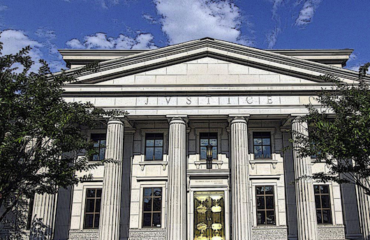Justice Speaks Podcast Episode #21
Voting represents the very essence of a democracy and in the last week or so several courts have struck down restrictions on this basic right.

In this podcast episode, Judges Peggy Hora (Ret.) and Brian MacKenzie (Ret.) discuss the recent court decisions involving one of our fundamental rights. These restrictions on the right to vote were passed in the wake of the U.S. Supreme Court’s decision in Shelby County v. Holder 133 S. Ct. 2612 (2013)
That case essentially struck down the portion of the Voting Rights Act of 1965 that required states that had been found to have discriminated against minority voters in the past had to have the approval of the Department of Justice before making changes to their laws. The Court said, “Nearly 50 years later, things have changed dramatically. Blatantly discriminatory evasions of federal decrees are rare.” Ah but were that so. As you can see in the cases below, North Carolina, Wisconsin, Texas, Michigan and Kansas all passed laws that were found to be discriminatory “50 years later.”
The North Carolina Voting Rights Restrictions
Perhaps the most important decision was issued by a panel of the Fourth Circuit Court of Appeals which ruled that a North Carolina voting law, the largest rollback of voting rights passed after the Shelby County case, was both unconstitutional and a violation of the 1965 Voting Rights Act. The court threw out not only the state’s strict voter ID law, but also other voting restrictions that could make it especially hard for minorities to vote. North Carolina NAACP v. McCrory, United States Court of Appeals for the Fourth Circuit: Case 16-1468, (2016).

Wisconsin’s Similar Law
On the same day another federal court came to similar conclusions about Wisconsin’s strict voting laws. Applying much the same reasoning as in McCrory the court vacated the state’s restrictions on voting. One Wisconsin Institute Inc., et al v. Gerald Nichol, et al. In the United States District Court for the Western District of Wisconsin Case: 3:15-cv-00324-jdp (2106) *
Voting Rights Restrictions in Texas
Also in July, the United States Court of Appeals for the Fifth Circuit ruled en blanc that Texas’s voter identification law had a racially discriminatory effect on African-American and Latino citizens. The Court sent the case back to the trial court to determine whether Texas acted with a racially discriminatory intent and to create a procedure to make it easier for those who lack a driver’s license to obtain a voter identification. Veasey v. Abbott United States Court of Appeals for the Fifth Circuit Case: 14-41127, (2016)
Michigan and Kansas Laws Discriminated
Meanwhile, In Michigan, a district court judge rejected the state’s elimination of straight-ticket voting while in Kansas, a state court voided a law that prevented citizens who could be eligible to vote for federal office from voting in Kansas state elections if they did not provide a birth certificate.
This podcast episode of Justice Speaks discusses the threads that connects all of these decisions and your voting rights.
* Update on Cases Cited
Update: Since this episode has been published, the case of One Wisconsin Institute Inc., et al. v. Gerald Nichol, et al. has been “stayed” by the 7th Circuit Court of Appeals – meaning that any further legal action on the case is stopped until further action by the Circuit Court of Appeals.
Video of this discussion
Below you can watch Judges Hora and MacKenzie discuss this issue on a video recording made while recording this podcast episode.
Get more articles like this
in your inbox
Subscribe to our mailing list and get the latest information and updates to your email inbox.
Thank you for subscribing.
Something went wrong.






